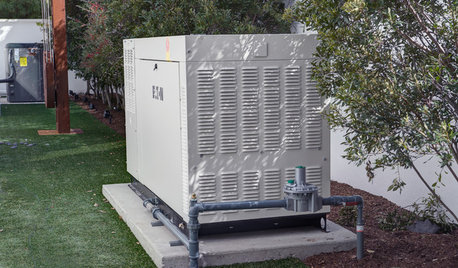More on diesel
steve_o
18 years ago
Related Stories

DISASTER PREP & RECOVERYMore Power to You: How to Pick the Right Generator
If your home's electricity goes, don't let it take your necessities with it — keep systems running with this guide to backup power
Full Story
EVENTSReport From Italy: Mustard Yellow, Hidden Kitchens and More
See what our team in Italy discovered at Salone del Mobile 2016. Which new design idea speaks to you?
Full Story
GREEN BUILDINGOff the Grid: Ready to Pull the Plug on City Power?
What to consider if you want to stop relying on public utilities — or just have a more energy-efficient home
Full Story
HOUZZ TOURSMy Houzz: Art and Lucky Finds Fill an Airy New House
Bicycle wheels, wire hangers, IV drips ... anything can become furniture in this artistic family's home
Full Story
SMALL HOMESHouzz Tour: Rolling With Simplicity in a Tiny House on Wheels
Just 240 square feet, this California home encourages efficient living — but there’s still room for yoga
Full Story
HOUZZ TVHouzz TV: Goodbye, Skyrocketing Rents; Hello, Waterfront Living
Tired of the congestion and high costs of San Francisco, this young techie bought a boat on the bay. See how she makes it her home
Full Story
HOME OFFICESQuiet, Please! How to Cut Noise Pollution at Home
Leaf blowers, trucks or noisy neighbors driving you berserk? These sound-reduction strategies can help you hush things up
Full Story
PETSWhat Chihuahuas Can Teach Us About Interior Design
Who knew these tiny dogs could be such a huge fount of design tips? Houzzers did
Full Story
GARDENING GUIDESVegetables and Flowers Mix in Beautiful Edible Gardens
Ornamentals, meet your edible garden mates. We know you'll get along just beautifully
Full Story
HOUZZ TOURSMy Houzz: High End Meets Budget Friendly in Toronto
Splurging selectively and saving elsewhere, a Canadian family gets a posh-looking home that matches their vision
Full Story


jeremy101
jemdandy
Related Discussions
Gasoline vs. diesel engines
Q
Any reason to NOT get a diesel?
Q
Are hybrids more environmentally sound?
Q
diesel owners time to check in
Q
cowboyind
jasonmi7
steve_oOriginal Author
gary__
steve_oOriginal Author
lynxville
cowboyind
jasonmi7
steve_oOriginal Author
cowboyind
uncledave_ct
steve_oOriginal Author
uncledave_ct
earthworm
jasonmi7
steve_oOriginal Author
jasonmi7
gary__
earthworm
cowboyind
jeremy101
cowboyind
jasonmi7
cowboyind
jasonmi7
steve_oOriginal Author
gooseberry_guy
Dimwit
cowboyind
jasonmi7